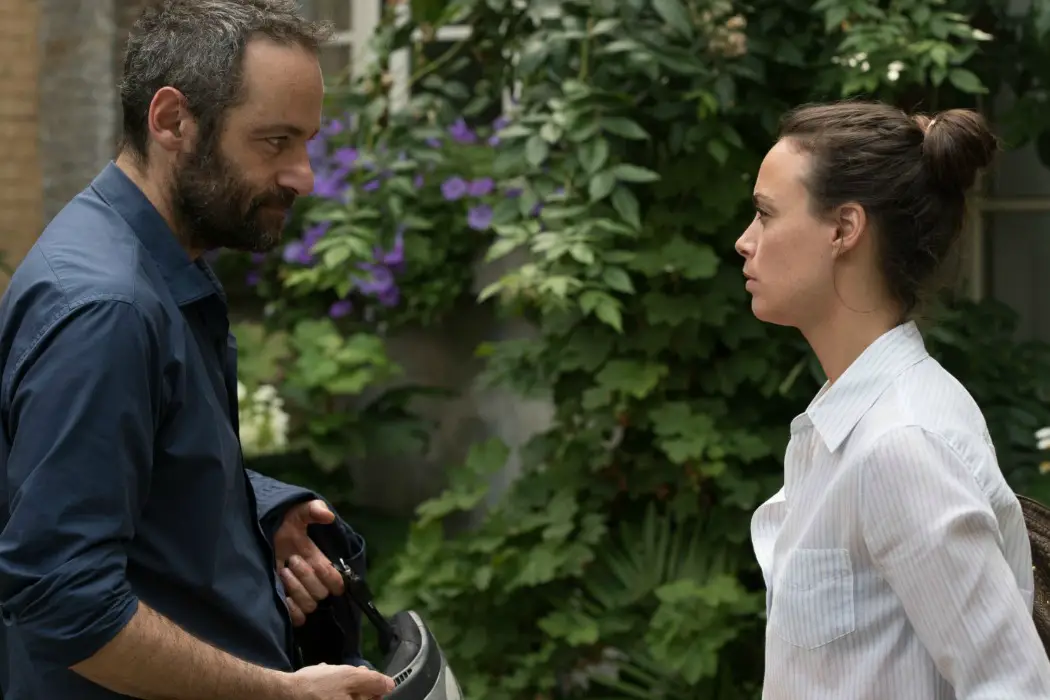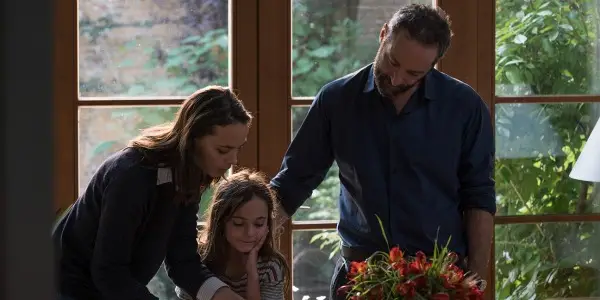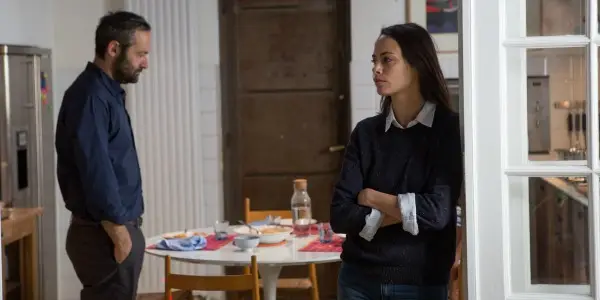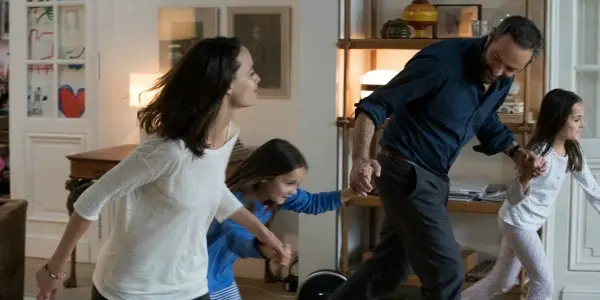AFTER LOVE: A Devastating Dissection Of A Marriage’s End

It took me a while to discover the wonderful world…
Though Bérénice Bejo and Jean Dujardin had been famous in France for years, it was the Oscar-winning silent comedy, The Artist that bought both actors into the global spotlight.
In the six years since that film was released, the career paths of both have diverged dramatically. Dujardin has found a home in comedies and light dramas like The Wolf Of Wall Street and The Monuments Men.
Bejo, on the other hand, has plumped almost exclusively for serious dramatic works. She collaborated with Iranian cinema legend, Asghar Farhadi on The Past, played a kindly doctor to a grieving man in Sweet Dreams, and the mother of a Hitler-esque infant in Childhood Of A Leader. Her latest downbeat drama is After Love.
Context For The Contention
After fifteen years together, Marie (Bejo), and Boris (Cedric Kahn), have separated. Except that they haven’t. Not really. Thanks to a row over who owns their house, though Marie and Boris are no longer romantically engaged, they still live under the same roof with their eight year-old twin daughters, Jade (Jade Soentjens) and Margaux (Margaux Soentjens).

As you’d imagine, the situation is horrendous. Marie and Boris hate each other, but they can’t show this in front of their kids. She is furious that he won’t leave, as she bought the house independently. He did construction work on the house that he maintains increased its market value so much that he deserves half its worth. And he isn’t leaving without his share.
They are at a stalemate. And matters are complicated further by the other feelings that being stuck together in such close proximity raises. After Love plunges us into this fractious relationship as we wait to see whether Marie and Boris will kiss and make up or actually kill each other.
Claustrophobia And Isolation
The first ninety of After Love’s hundred minutes take place solely within the home of Boris and Marie. Even the garden, which at one point becomes the scene of an excruciating dinner party, is completely cordoned off from the outside world. The house has few visitors; aside from those at that one awkward dinner gathering, and during the occasional visits from her mother (Marthe Keller), there are no other adults for either Boris or Marie to confide in. They are stuck together in their isolation.
Writer/director Joachim Lafosse favours long shots over quick cuts, which provides an invaluable sense of space, or rather, the lack of it. There is nowhere for Boris and Marie to escape from each other. The house is all on one level, and with their young twins running around all over the place, alone time is almost impossible to come by.
Of course, the small space where the action unfolds means that tensions are always running high. In an atmosphere of such unyielding agitation, the smallest things can lead to major rows. “Everything about him drives me mad… the slightest remark!” says Marie at the aforementioned dinner party. She is as frustrated with her reaction to her ex as she is with him; she didn’t sign up to become someone who would nearly come to blows over a block of cheese, but the claustrophobic, emotional intensity of her living situation has brought her to it.
Emotional Anguish
Lafosse‘s 2012 drama, Our Children was based on the real-life story of Geneviève Lhermitte, who, as a result of severe mental issues, killed her five children. Whilst After Love never hits the same level of harrowing, the body of both films is composed of a persistent, unyielding despair.

The claustrophobia plays a big part of this, as well as the complex emotions that it provokes. It’s a cliché because it’s true; the line between hate and love is indeed very thin. To be stuck in the same house that you lived in happily with your beloved for so many years, with the kids that were created out of that love, and who are both hoping you get back together, is a very special kind of agony.
Bejo is particularly good at portraying this. Marie has a no-nonsense, efficient exterior, but it’s obvious she has only worked so hard at building it up so as not to be broken by the impossible situation. Her determination to maintain this tough shell, and the sadness that slips through on occasion when the cracks appear, is deeply affecting.
It’s no surprise that the tense, close-quarters relationship, with so much history behind it, always seems just on the verge of breaking into something sexual. Especially as one half of the couple seems so keen on reigniting the flame of romance…
Kramer Vs. Kramer Redux?
To treat the central feud in After Love like a prize fight, where it’s fun to pick a team and root for your combatant, is undeniably reductive. But, similarly to the way that Kramer Vs. Kramer (namechecked in one of this movie’s taglines) comes down on the side of the Dustin Hoffman character, After Love certainly seems more sympathetic to Marie than Boris.
We never learn what was the final straw that ended their relationship, but it’s clear that Marie was the one to end it. It’s not hard to see why. Boris makes promises to the kids that he can’t keep, and then gets angry when she makes it up to them. He will not stop referring to her family’s wealth, though she does have a job, and has done more to support their family than he has.
She wants him out; he wants to stay, not for her to leave. Any time that Boris is not insulting, or needling her, he is trying to get back together with her. He’s not averse to using emotional manipulation to achieve his goal. In an early conversation with their daughters, who are worried by the constant shouting, he tells them there’s a chance their parents will reunite. This is at best a stupid thing to do, and at worst a real emotional cruelty against both his children and ex-wife. It’s clear that there is to be no permanent reconciliation here; the film is called After Love, after all. But that doesn’t stop him trying.

In After Love‘s most memorable scene, Marie and Boris are watching their twins perform a dance routine. The kids pull their dad to his feet, and he starts to join in. Then, seeing that Marie is on the verge of tears, Boris tells one of the girls, “Fetch Mummy.” The adults embrace, and then as soon as the girls are asleep, fall into the marital bed.
It’s not long before the two are back to feuding, but the way Boris engineers this situation to knock down her painstakingly constructed emotional safeguards is galling. Bejo‘s performance is terrific throughout, but in the dance sequence, she is gutwrenching.
And then you remember that he too is suffering. He doesn’t want his relationship to end; and under a different light, his untoward tactics in trying to salvage his marriage seem pitiable, not sinister. It is too complex and layered a film to be easily reduced to a fight between a ‘goodie’ and a ‘baddie’. Everyone here is a human being, and everyone is hurting. That’s what makes it all so agonising.
After Love: In Conclusion
After Love thrusts you into the middle of a domestic war zone. Thanks to the claustrophobia and heightened tension, there are very few moments in the film that aren’t fraught with emotion; whether it be fury, devastation, or even, on occasion, love (or at least what’s left of it).
As such, it’s not an easy film to watch. Those wishing for an escapist cinematic experience should look elsewhere. There’s no vicarious pleasure to be found in this searing dissection of the remnants of love. It’s upsetting, exhausting and unsparing.
But, if it’s intensity of atmosphere, insightful character study and a career-best performance from Bérénice Bejo you want, then you won’t go wrong with After Love.
How does After Love compare to your favourite domestic dramas?
After Love is out now in the UK, and on August 9th in the US. For all other release dates, click here.
Does content like this matter to you?
Become a Member and support film journalism. Unlock access to all of Film Inquiry`s great articles. Join a community of like-minded readers who are passionate about cinema - get access to our private members Network, give back to independent filmmakers, and more.
It took me a while to discover the wonderful world of cinema, but once I did, everything just fell into place.













